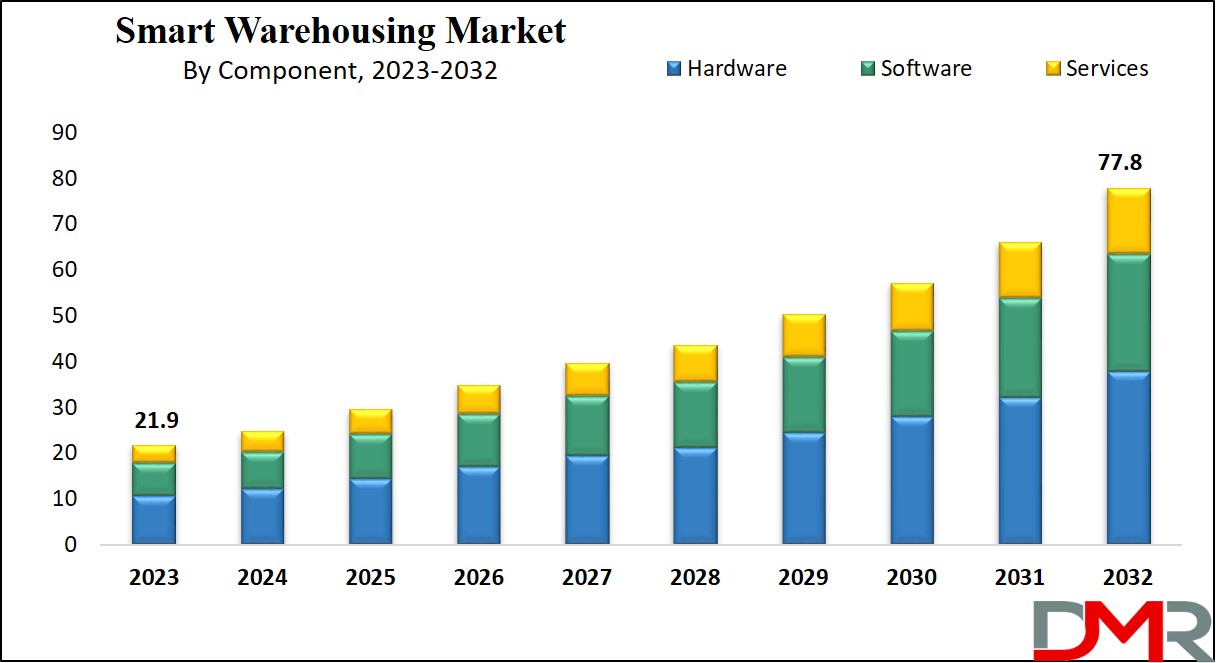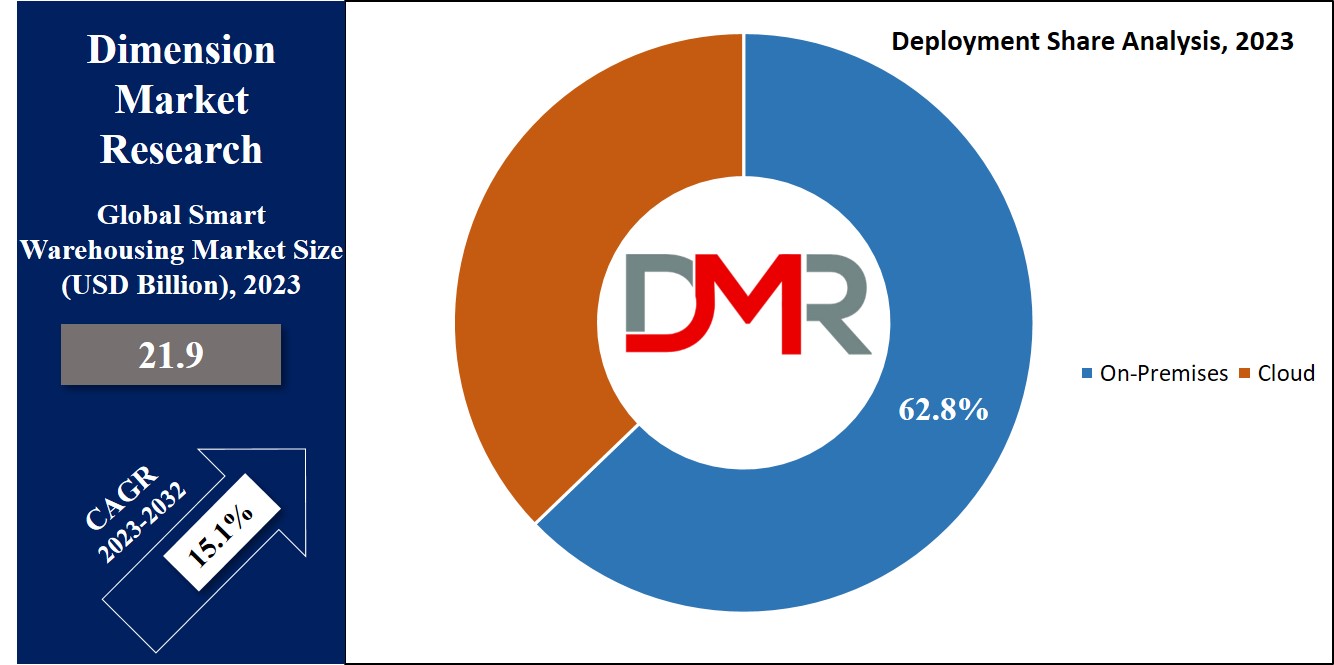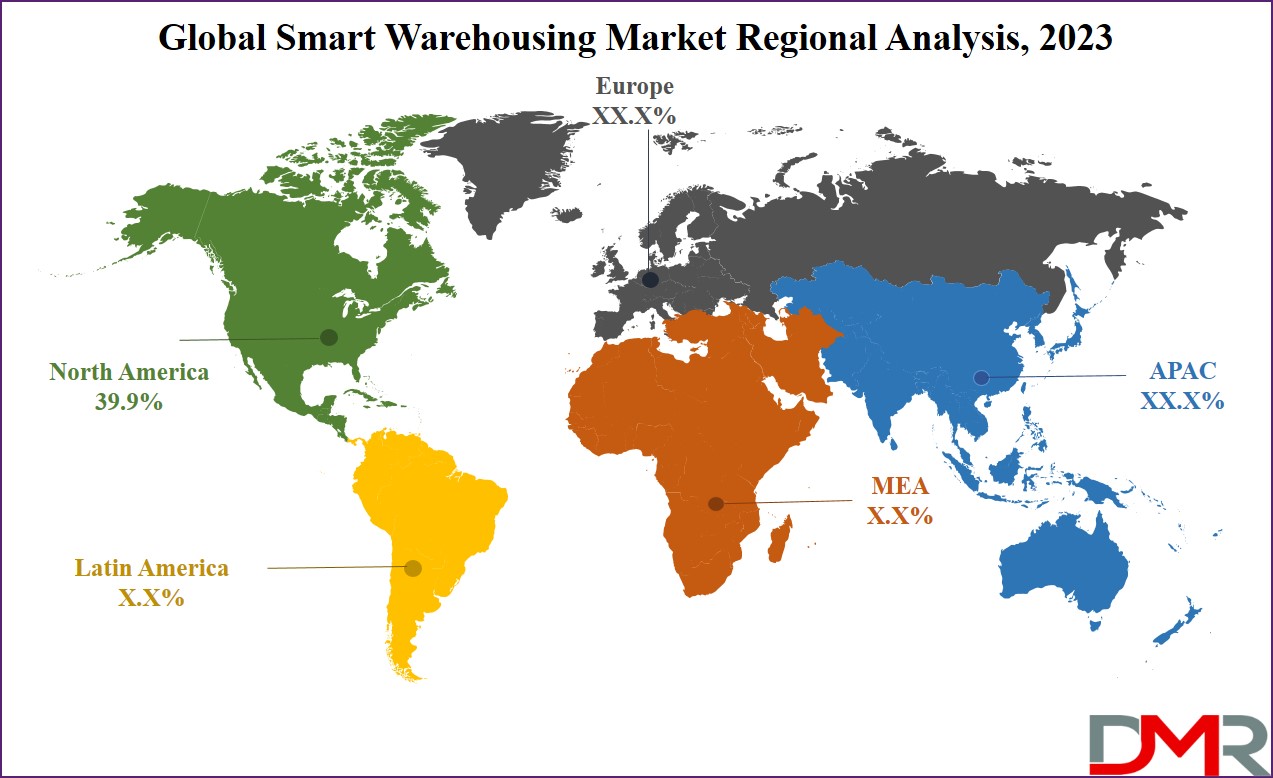New York, May 27, 2024 (GLOBE NEWSWIRE) -- Overview
The Global Smart Warehousing Market size was valued at USD 21.9 billion in 2023 and it is further anticipated to reach a market value of USD 77.8 billion by 2032, according to Dimension Market Research. The market is anticipated to register a CAGR of 15.1% during the forecast period.
Smart warehouses are spacious facilities that store goods and use computer systems, and machines to handle human tasks like order processing, storage, and inventory management. Technologies like RFID, AGV, IoT, and analytics minimize errors in these operations, driving the increasing adoption of such technologies in the smart warehousing market.
Click to Request Sample Report and Drive Impactful Decisions: https://dimensionmarketresearch.com/report/smart-warehousing-market/request-sample/

In the context of the component, this market is led by hardware components, holding the largest market share. Since automated tools are easier to employ through smartphones, the adoption of hardware is widespread across stores and presents benefits in terms of efficient inventory management as well as streamlined labor costs.
In terms of technology, this market includes AI in Warehouses, IoT and Analytics, AGV, Blockchain, RFID, and related technologies. IoT analytics plays a pivotal role by harnessing and analyzing data from IoT devices, aligning with Industrial IoT to optimize processes.
Important Insights
- Projections suggest a substantial surge, within the global smart warehousing market as it is expected to show noteworthy growth by reaching USD 77.8 billion by 2032, with a significant CAGR of 15.1%, commencing from its 2023 base value of USD 21.9 billion.
- The market is dominated by the hardware sector, driven by the widespread adoption of automated tools via smartphones. This enhances efficiency, minimizes labor costs, and fosters innovation in response to increasing demand for IoT, sensors, and AI technologies.
- This market is divided into Cloud and on-premises deployment, with the on-premises segment holding a significant share, driven by businesses in emerging economies prioritizing data security and control.
- The Global Smart Warehousing Market is segmented by applications, including Inventory Management, Transport Management, Yard Management, Order Management, Shipping Management, and related functions. These segments streamline operations, enhancing efficiency and customer satisfaction.
- North America leads the global smart warehousing market with a 39.9% revenue share in 2023, propelled by its proactive adoption of advanced technologies. The region's innovation hub status and openness to cutting-edge solutions create a promising environment for smart warehousing enterprises, fostering development and market success.
Global Smart Warehousing Market: Trends
- AI-Powered Predictive Analytics: The integration of AI and machine learning for predictive analytics allows smart warehouses to project demand, optimize inventory levels, and enhance overall operational efficiency.
- Robotics and Automation: Growth in the adoption of robotics and automation technologies, like autonomous mobile robots (AMRs) and automated guided vehicles (AGVs), for tasks like picking, packing, and sorting, to improve speed and accuracy in warehouse operations.
- IoT-enabled Smart Sensors: Installing IoT-enabled smart sensors throughout the warehouse environment for real-time monitoring of inventory, equipment health, and environmental conditions, allowing proactive maintenance and optimization of resources.
- Cloud-Based Warehouse Management Systems (WMS): Switch towards cloud-based WMS solutions, providing scalability, flexibility, and accessibility from anywhere, empowering businesses to effectively manage and optimize their warehouse operations while minimizing IT infrastructure costs.
Smart Warehousing Market: Competitive Landscape
The global smart warehousing market experiences strong competition, with industry leaders leveraging innovative technologies such as automation, AI, and IoT to boost warehouse efficiency. Acquisition strategies and collaborations with tech providers and logistics partners are common. Also, key players prioritize research and development to gain a competitive edge over others.
Some of the major players in the market include SAP, Oracle, IBM, Generix, Infor, Korber, and more.
Some of the prominent market players:
- SAP
- Oracle
- IBM
- Generix
- Infor
- Korber
- Reply
- Tecsys
- WareIQ
- PTC
- Other Key Players
Transform your business approach with strategic insights from our report. Get in touch to request our brochure today at https://dimensionmarketresearch.com/report/smart-warehousing-market/download-reports-excerpt/
Smart Warehousing Market Scope
| Report Highlights | Details |
| Market Size (2023) | USD 21.9 Bn |
| Forecast Value (2032) | USD 77.8 Bn |
| CAGR (2023-2032) | 15.1% |
| Leading Region in terms of Revenue Share | North America |
| Percentage of Revenue Share by Leading Region | 39.9% |
| Historical Data | 2018 - 2023 |
| Forecast Data | 2025 – 2032 |
| Base Year | 2023 |
| Estimate Year | 2024 |
| Segments Covered | By Component, By Deployment, By Technology, By Application |
| Regional Coverage | North America, Europe, Asia Pacific, Latin America, Middle East & Africa (MEA) |
Segment Analysis:
In terms of deployment, the global smart warehousing market is divided into Cloud and on-premises, among these the on-premise segment led in 2023, which is due to the preference of businesses in emerging countries for on-premises solutions, driven by better data security and control. Also, the adoption aligns with specific needs and regulatory requirements, serving as a significant growth driver.

Smart Warehousing Market Segmentation
By Component
- Hardware
- Software
- Services
By Deployment
- On-Premise
- Cloud
By Technology
- IoT & Analytics
- AI in Warehouse
- Automated Guided Vehicles
- RFID
- Blockchain in Warehouse
- Others
By Application
- Transport Management
- Inventory Management
- Order Management
- Yard Management
- Shipping Management
- Others
Click to Request Sample Report and Drive Impactful Decisions at https://dimensionmarketresearch.com/report/smart-warehousing-market/request-sample/
Global Smart Warehousing Market: Driver
- Technological Advancements: Constant innovation in IoT, AI, robotics, and automation improves efficiency and accuracy in warehouse operations.
- E-commerce Expansion: The fast growth of e-commerce demands requires warehousing solutions to handle better order volumes and customer expectations for faster delivery.
- Supply Chain Optimization: Smart warehousing provides real-time visibility, inventory management, and predictive analytics, allowing companies to optimize their supply chain and low costs.
- Government Initiatives: Supportive policies and investments in infrastructure, mainly in emerging economies, allow the adoption of smart warehousing solutions to enhance logistics and competitiveness.
Global Smart Warehousing Market: Restraints
- High Initial Investment: The execution of smart warehousing technologies needs high upfront investment in infrastructure, technology, and workforce training, which can be a challenge for some companies.
- Data Security Concerns: With the growth in dependency on digital technologies, there are higher concerns about data security and privacy breaches, mainly considering the higher amount of sensitive information stored in smart warehouses.
- Legacy Systems Integration: Many warehouses still operate with legacy systems that may not simply integrate with new smart technologies, causing compatibility issues and complexities during the transition phase.
- Lack of Skilled Workforce: The successful operation of smart warehouses needs a skilled workforce capable of managing and using advanced technologies effectively. However, there may be a shortage of such talent, impacting broad adoption.
Global Smart Warehousing Market: Opportunities
- Expansion of Last-Mile Delivery Solutions: Smart warehousing provides efficient last-mile delivery, allowing companies to improve customer satisfaction and capture a larger share of the e-commerce market.
- Integration of Blockchain Technology: Blockchain can improve transparency, traceability, and security in supply chains, providing opportunities for smart warehousing to integrate this technology for better inventory management and logistics.
- Emerging Markets Adoption: New markets provide significant opportunities for the adoption of smart warehousing solutions as companies looking to simplify operations, improve efficiency, and meet the increased demand for logistics services.
- Customization and Personalization: Smart warehousing allows for greater customization and personalization of services, making companies provide customized solutions to meet the specific needs of clients in many industries, like retail, healthcare, and automotive.
Regional Analysis
North America leads the global market with a 39.9% revenue share in 2023, driven by evolving lifestyles, online retail trends, and various other factors. North America is the primary driver of the global smart warehousing market, contributing the highest portion of total revenue. The growth within the region is driven by being proactive in development and adopting cutting-edge technologies, especially advanced smart warehousing. As an innovation hub, North America is renowned as receiving a favorable environment for companies in this sphere and the chances to develop further when addressing its market landscape are tremendous.

By Region
North America
- The U.S.
- Canada
Europe
- Germany
- The U.K.
- France
- Italy
- Russia
- Spain
- Benelux
- Nordic
- Rest of Europe
Asia-Pacific
- China
- Japan
- South Korea
- India
- ANZ
- ASEAN
- Rest of Asia-Pacific
Latin America
- Brazil
- Mexico
- Argentina
- Colombia
- Rest of Latin America
Middle East & Africa
- Saudi Arabia
- UAE
- South Africa
- Israel
- Egypt
- Rest of MEA
Purchase the Competition Analysis Dashboard Today at https://dimensionmarketresearch.com/checkout/smart-warehousing-market/
Recent Developments in the Smart Warehousing Market
- August 2023: Infor announced that Zofri will introduce the Infor WWS warehouse management system to provide better customer support.
- May 2023: To unify the supply chain Manhatton Associates introduced a re-imagined Manhattan Active Yard Management solution for the expansion of their company.
- March 2023: Popular furniture and mattress retailer, Raymor & Flanigan have formed a partnership with Korber to tackle the challenges this market faces in warehousing.
- March 2023: Marks & Spencer Reliance India Private Limited, a British retailer and IBM have formed a collaboration to promote the supply chain to enhance the relationship between online and in-store operations.
- January 2023: Tecsys announced its new project warehouse in a warehouse e-commerce solution that will give retailers & brands to execute e-commerce warehousing.
- May 2022: The U.S. government introduced a 5G smart warehouse network under their 5G-NextGeneration Initiative. This Facility provides accurate tracking of consignments within the given time frame.
Browse More Related Reports
The Global Computer Graphics Market is expected to reach a value of USD 29.4 billion in 2023, and it is further anticipated to reach a market value of USD 66.3 billion by 2032 at a CAGR of 9.4%.
The Global Digital Signage Market is expected to have a value of USD 28.3 billion in 2023, and it is further predicted to reach a market value of USD 58.1 billion by 2032 at a CAGR of 8.3%.
The Global Health Intelligent Virtual Assistant Market is expected to reach a value of USD 1,242.2 million in 2023, and it is further anticipated to reach a market value of USD 20,901.0 million by 2032 at a CAGR of 36.8%.
The Global Hyperautomation Market is expected to reach a value of USD 12.1 billion in 2023, and it is further anticipated to reach a market value of USD 83.5 billion by 2032 at a CAGR of 23.9%.
The Global Point of Sale Display Market is expected to reach a value of USD 14.4 billion in 2023, and it is further anticipated to reach a market value of USD 30.0 billion by 2032 at a CAGR of 8.5%.
The Global Web 3.0 Market is expected to reach a value of USD 5.0 billion in 2023, and it is further anticipated to reach a market value of USD 142.0 billion by 2032 at a CAGR of 45.1%.
Global Wireless Display Market is expected to reach a value of USD 5.1 billion in 2023, and it is further anticipated to reach a market value of USD 14.1 billion by 2032 at a CAGR of 12.0%.
The Global Interactive Display Market is expected to reach a value of USD 47.2 billion in 2023, and it is further anticipated to reach a market value of USD 95.2 billion by 2032 at a CAGR of 8.1%.
Global Industrial Display Market is expected to reach a value of USD 6.0 billion in 2023, and it is further anticipated to reach a market value of USD 10.8 billion by 2032 at a CAGR of 6.8%.
The Global Smart Demand Response Market is expected to reach a value of USD 29.7 billion in 2023, and it is further anticipated to reach a market value of USD 132.0 billion by 2032 at a CAGR of 18.0%.
About Dimension Market Research (DMR):
Dimension Market Research (DMR) is a market research and consulting firm based in India & US, with its headquarters located in the USA (New York). The company believes in providing the best and most valuable data to its customers using the best resources analysts into work, to create unmatchable insights into the industries, and markets while offering in-depth results of over 30 industries, and all major regions across the world. We also believe that our clients don’t always want what they see, so we provide customized reports as well, as per their specific requirements to create the best possible outcomes for them and enhance their business through our data and insights in every possible way.
